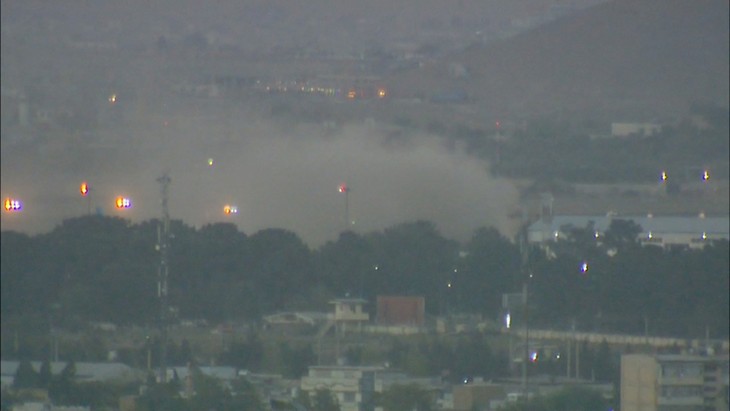(VOVWORLD) - Two suicide bombings occurred at Hamid Karzai International Airport in Kabul, Afghanistan, on Thursday, killing at least 85 people, including 13 US service members. The deadly attacks are the latest development in the crisis that seized Afghanistan when the Taliban entered Kabul and took control of the whole country on August 15.
 The blasts at Hamid Karzai International Airport in Kabul, Afghanistan, on Thursday (photo: CNN) The blasts at Hamid Karzai International Airport in Kabul, Afghanistan, on Thursday (photo: CNN) |
The blasts came just a few days before the US’s August 31 deadline for completing its military withdrawal from Afghanistan. Thousands of Afghanis have been pouring into Hamid Karzai Airport hoping to join the evacuation.
Serious security challenge
Hours after the attacks, US President Joe Biden vowed retaliation, while promising to continue the evacuation effort. Analysts say the military withdrawal is under a lot of pressure.
The Islamic State’s affiliate in Afghanistan claimed responsibility for the blasts and threatened to conduct similar attacks in the future. General Kenneth McKenzie, head of the US Central Command, said he expects attacks to continue at Hamid Karzai Airport.
The Taliban has not made any concessions concerning the US’s military withdrawal. Taliban spokesman Zabihullah Mujahid said flights to evacuate foreigners from Hamid Karzai Airport will be considered a violation of the agreement if they continue after August 31. Another Taliban spokesman, Suhail Shaheen, warned that the international coalition will have to pay if they violate the withdrawal agreement.
War and humanitarian crisis
Fighters at the last major outpost of anti-Taliban resistance in Panjshir valley said they will fight to the end. Led by Ahmad Massoud, son of the famed anti-Taliban leader Ahmad Shah Massoud, the group has thousands of fighters, most of them trained government forces.
Afghanistan’s Vice President AmrullahSaleh, who declared himself acting President after President Ashraf Ghani left the country on August 15, is now in Panjshir valley, the only place in Afghanistan that remains out of the Taliban’s control, similar to the Taliban’s regime from 1996 to 2001.
The Taliban said early this week it will send fighters to Panjshir to pressure the opposition. So far there has been no clash between them, but fighting is said to be inevitable.
Clashes will worsen the humanitarian crisis in Afghanistan. A prolonged civil war and the COVID-19 pandemic have exhausted the Afghan economy and people are now suffering from a severe food shortage.
The UN reports that nearly 18 million people, about half the Afghan population, are in need of humanitarian aid. Prolonged fighting will also affect other countries in the region, who will have to deal with asylum seekers.
Many countries and organizations have called for a political solution inAfghanistan. Josep Borrell, High Representative of the European Union for Foreign Affairs and Security Policy, said on Tuesday that talks with the Taliban should happen as soon as possible to avoid a humanitarian and migration crisis in Afghanistan.